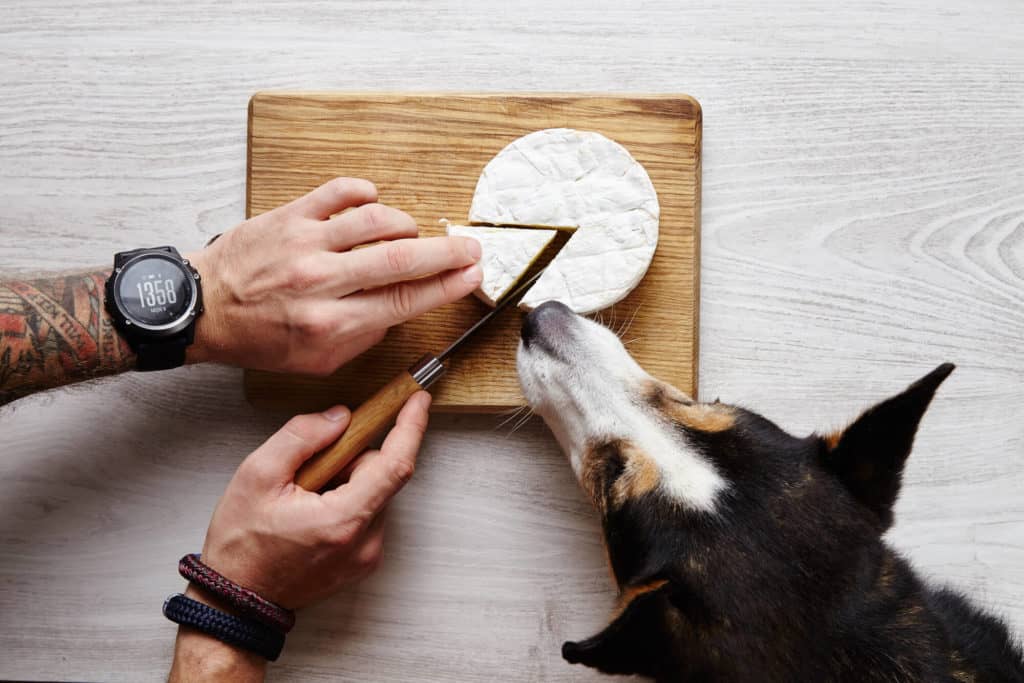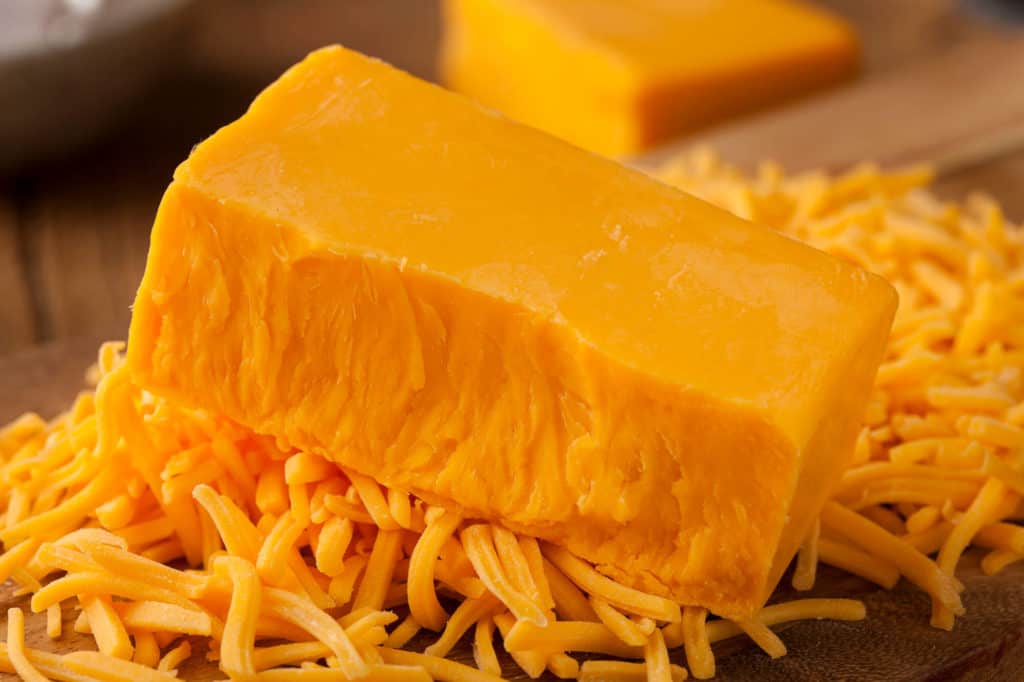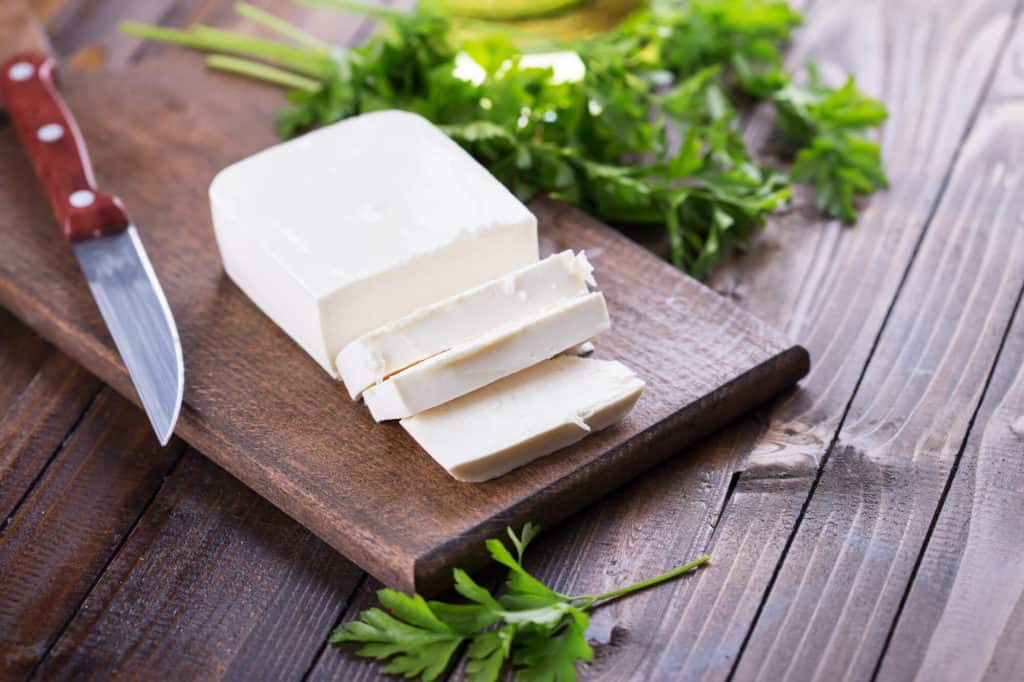Dogs can eat brie as an occasional treat. However, brie is a fatty cheese that can lead to pancreatitis if eaten in large quantities.
Dogs generally love cheese, but that doesn’t mean you can give it to them anytime.
While consuming brie is relatively safe, it’s still important to consider its effects on your dogs. As with all things, moderation is key.
How Much Brie Can Dogs Eat?
Brie is high in saturated fat and salt content. So, adding it to your dog’s regular diet isn’t ideal.
As a rule of thumb, only give your dog about one gram of brie to avoid digestive complications. One gram contains only about ten calories.
Letting your dog become accustomed to consuming brie is a dangerous game. This habit can put them at greater risk of gaining weight and developing pancreatitis.

Helpful Dog Training Resource:
For help with training your dog, you should take a look at The Online Dog Trainer by Doggy Dan. Doggy Dan is an expert Dog Trainer based in New Zealand. His online resource contains Hundreds of Excellent Dog Training Videos that will take you step-by-step through the process of developing a healthy, happy well-behaved dog.
What Happens When A Dog Eats Too Much Brie?
Brie can cause plenty of side effects. If your dog accidentally consumes more than the recommended serving, make sure to check for the following symptoms:
- Abdominal discomfort
- Bloating
- Diarrhea
- Fever
- Increased water intake
- Loss of appetite
- Seizure
- Vomiting
If any of these symptoms persist for more than a day, it can be a sign of pancreatitis or another serious condition. Bring your dog to the vet immediately.
What Should You Consider When Giving Dogs Brie?
You might give in to your dog’s begging eyes and give them a treat once in a while. However, before giving in, remember to consider some things.
Precaution
If you’re not sure whether your dog can eat something, always consult your vet first.
Your vet will know whether giving brie to your dog is safe. If your dog has any of the following conditions, it’s even more important to seek your vet’s advice first:
- Old Age
- Nursing
- Pregnant
- Has existing health condition
Labels and Ingredients
Checking labels and ingredients is another important thing to consider before handing your dog some brie.
You should look for the expiration date, added ingredients, and general appearance of the brie. Inspecting these labels can tell you whether there’s a toxic ingredient or something your dog is allergic to.
What you should pay most attention to is the list of added ingredients. Brie can contain spices that are toxic to dogs, such as:
Onion
Onions contain N-propyl disulfide, which breaks down your dog’s red blood cells. Continuous ingestion of onion can lead to anemia or other severe conditions.
It’s important to remember that any form of onion can be toxic to your dog. Whether it’s raw, powdered, or a plant, you should keep your dog away from it.
Garlic
Like onions, garlic targets your dog’s red blood cells. It contains thiosulfate, a compound that alters the shape of a red blood cell.
Garlic powder is the most toxic form of garlic for dogs.
Salt
Salt may seem like a harmless spice for humans, but dogs can suffer from severe dehydration if they consume it in large amounts.
Dogs shouldn’t consume more than 1.5 grams of salt per pound of their weight.
Lactose Intolerance
Did you know dogs can be lactose intolerant, too?
Once dogs outgrow their nursing phase, they stop producing lactase. Lactase is an enzyme that helps with the digestion of dairy products.
Generally, the effects of lactose intolerance are more evident when dogs drink milk. Other dairy products like cheese or yogurt are easier to digest.
Even so, if your dog is lactose intolerant, it may be safer to steer clear of all dairy products.
What Cheese Can Dogs Eat Aside From Brie?
Not all cheese is toxic to dogs. You can feed the following cheeses to your dog in moderation:
Cheddar Cheese
Cheddar cheese is a staple dairy in almost every American home. This aged cheese has low lactose content, making it safe for dogs.

Cottage Cheese
Cottage cheese is another healthy cheese snack for your dog. Aside from being low in lactose, it also contains healthy fats and protein.
Mozzarella
Mozzarella has low fat and lactose content, which makes it acceptable for dogs to snack on. Remember to give it in small amounts to avoid weight gain.
Swiss Cheese
Like cheddar and mozzarella, swiss cheese doesn’t have a lot of lactose that can harm your dog.
It’s also low in fat, so it shouldn’t cause digestive issues if consumed in reasonable amounts.
Helpful Dog Health Resource:
Note: Our Health is #1 Priority. It should be no different for your dog. But you need to help him. The Ultimate Guide to Dog Health is the answer. This handy guide will help you recognize the symptoms of the health problems above. Get the knowledge to stay ahead of these terrible issues that can rob your lovely dog from vigor and life. Help your friend make it to 14 yrs+ without pain and suffering.
What Cheese Can’t Dogs Eat?
Of course, if there are safe cheeses, there are also unsafe ones.
Blue-Veined Cheese
Blue-veined cheeses are toxic to dogs. When blue cheeses ripen, they produce a toxin called roquefortine. This toxin is lethal for dogs at any amount.
If your dog consumes any of the following blue cheeses, make sure to bring them to the vet immediately:
- Cabrales
- Danish Blue
- Gorgonzola
- Roquefort
- Stilton
Dogs that consume any blue cheese, especially in large amounts, can experience the following symptoms.
- Lethargy
- Excessive panting
- Vomiting
- Muscle tremors
- Rapid heart beating
- Increases sensitivity
- Seizure
Herb Cheese
Herb cheeses like cream cheese or Havarti contain spices that can be harmful to your dog’s health. They’re also high in fat content.
Feta
Because of its fatty acids, feta cheese contains high amounts of saturated fat.
One serving of feta can contain 22% of fat. However, the recommended amount of fat content for a dog’s diet is less than 18%.
So, feeding your dog feta cheese can increase their risk of obesity.

Goat Cheese
Goat cheese is another example of cheeses with high saturated fat content. It has a higher fat content than feta, which can amount to 32% per serving.
What Benefits Does Cheese Have For Dogs?
Safe cheeses have nutrients that can help with your dog’s development. Some of these nutrients include:
- Protein
- Calcium
- Vitamin A
- Fatty acids
- B-complex vitamins
Aside from having health benefits, many dog owners use cheese for training. If your dog loves cheese, you can always use it as a treat.
Additionally, feeding your dog some cheese is one way to calm your pup down when they suffer separation anxiety.

Paul has been creating content for the dog niche for many years. The information he shares comes his first hand experience growing up in dog lovers household and then owning multiple dog breeds of his own as an adult. Paul enjoys doing the hard research to collect, analyze and present our dogtemperament.com readers with the best answers to their questions.